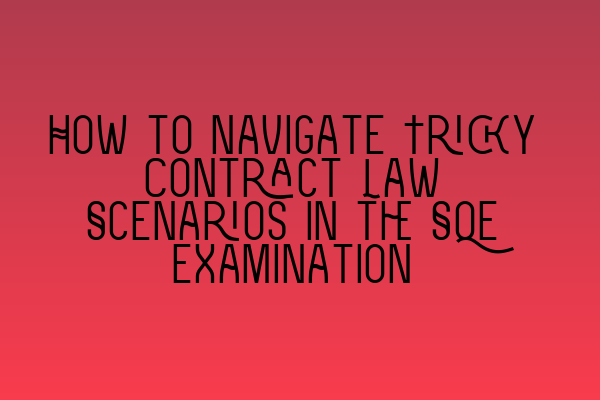How to Navigate Tricky Contract Law Scenarios in the SQE Examination
Contract law can be a complex and challenging area to navigate, and when it comes to the SQE examination, it’s crucial to have a solid understanding of how to approach tricky scenarios. In this blog post, we will explore some key strategies and tips to help you tackle these scenarios with confidence and success.
Before we dive in, it’s important to note that contract law is an essential component of the SQE examination. It tests your knowledge and understanding of contractual principles, as well as your ability to apply them to real-life scenarios. So, let’s get started!
1. Review key principles and concepts
First and foremost, it’s essential to have a strong foundation of the key principles and concepts in contract law. Make sure you have a solid grasp of topics such as offer and acceptance, consideration, intention to create legal relations, and the various types of terms that can be included in a contract.
If you need a refresher on any of these topics, you can refer to our related article on the impact of frustration on contractual obligations.
2. Identify the issues
When faced with a tricky contract law scenario in the SQE examination, it’s crucial to carefully read the problem question and identify the key issues at hand. This involves analyzing the facts and identifying any potential breaches or disputes that may arise.
By breaking down the scenario into smaller, manageable issues, you can approach each one systematically and provide a structured response.
3. Apply the law
Once you have identified the key issues, it’s time to apply the relevant contract law principles to the scenario. This involves using your knowledge and understanding of contract law to analyze the facts, identify the legal rights and obligations of the parties involved, and determine the potential legal consequences.
Remember, it’s important to support your analysis with case law and statutory provisions where applicable. This demonstrates a deeper understanding of the subject matter and adds credibility to your answer.
If you’re unsure about how to interpret specific contractual clauses, our related article on unlocking the hidden meanings of contractual clauses can provide valuable insights.
4. Consider practical implications
Contract law is not just about theoretical concepts and legal principles; it also has practical implications. When tackling tricky scenarios in the SQE examination, it’s important to consider the practical implications of your analysis.
Think about the potential consequences of your advice or proposed solutions. How would they affect the parties involved? Are there any ethical or commercial considerations to take into account?
This holistic approach demonstrates a broader understanding of the subject matter and the ability to consider both legal and real-world implications.
5. Structure your answer
When writing your answer to a contract law scenario in the SQE examination, it’s crucial to structure your response in a clear and logical manner. This not only helps you organize your thoughts but also makes it easier for the examiner to follow your analysis.
Start with a brief introduction, outlining the key issues and providing a roadmap for your answer. Then, dive into each issue one by one, presenting your analysis and supporting it with relevant legal authorities. Finally, conclude your answer by summarizing your findings and offering any additional insights or recommendations.
If you’re looking for more guidance on structuring your answer or understanding the key considerations for entrepreneurs when drafting business contracts, our related article on legal aspects of business contracts can be a valuable resource.
6. Practice, practice, practice
As with any other skill, the key to success in contract law scenarios is practice. Make use of past examination papers and practice questions to hone your skills and develop your ability to analyze complex scenarios under time-pressure.
By practicing regularly, you can familiarize yourself with the types of questions that may arise in the SQE examination and gain confidence in applying your knowledge to different scenarios.
Conclusion
Navigating tricky contract law scenarios in the SQE examination can be challenging, but with the right strategies and preparation, you can tackle them with confidence. Remember to review key principles and concepts, identify the issues, apply the law, consider practical implications, structure your answer, and practice regularly.
For further insights on agreements in contract law or a comparative analysis between SQE contract law and traditional qualifications, you can refer to our related articles on various types of agreements in contract law and SQE contract law versus traditional qualifications.
Good luck with your preparation, and we hope these tips prove valuable in navigating tricky contract law scenarios during your SQE examination!
